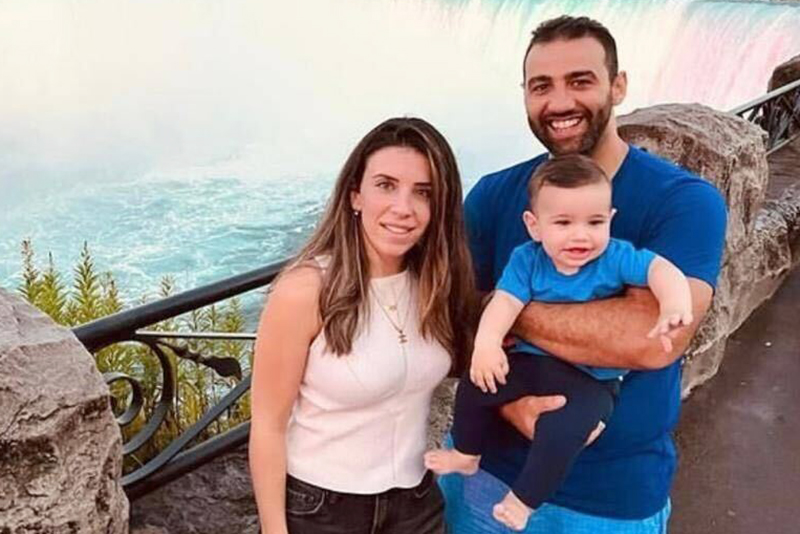UPDATE (Nov. 3, 2023, 7:16 p.m. ET): According to attorney Sammy Nabulsi, the Okals departed Gaza and crossed safely into Egypt through the Rafah Crossing shortly after 11:30 a.m. Gaza time on Thursday, Nov. 2, and on Friday were being transported to Cairo by United States Consular Affairs.
The Okals, who own a beautiful home in a Boston suburb, are your typical Massachusetts family. Abood earned his Ph.D. from the University of Utah and works for a large pharmaceutical company in Cambridge. His wife, Wafaa, worked for a local nonprofit, focusing on workforce development. They have a 1-year-old son, Yousef, whom they take on playdates with other children. They have a dog named Lilly. They are U.S. citizens. They carry U.S. passports. And they are among the hundreds of U.S. citizens who are trapped in Gaza as the Biden administration, rather than treating them as people who are deserving of urgent action from their government, has allowed them to become more like bargaining chips.

The Biden administration, rather than treating them as people who are deserving of urgent action from their government, has allowed them to become more like bargaining chips.
Weeks ago, the Okals, who are friends I’ve advocated for with the State Department, traveled to Gaza to visit Wafaa’s parents and introduce them to their grandson. Based on photographs Abood shared, they went to the beach, visited the sites, gathered with family for meals, and the children played on their iPads during down time. Yousef rode a horse with his dad.
Everything changed on Oct. 7, when Hamas carried out its deadly and brutal attacks on Israelis. Not just for the Okal family, of course, but for everyone, everywhere. But in their case, they’ve been misled by officials from the U.S. State Department. On Saturday, Oct. 21, the Okals received text messages, a phone call and an e-mail from State Department officials advising them that the Rafah crossing, through which they could get to Egypt, would open at 10 a.m. Minutes before 10, a State Department official sent a message to Abood, stating: “[w]e are ten minutes away, I hope you’re there. Please let me know as soon as you make it across.”
They arrived at the Rafah crossing before 10. During the six hours they waited, not a single person was permitted to cross. Saturday, Oct. 21, was the third time the State Department alerted the Okals about an opening at the Rafah crossing on a specific date and time, but U.S. citizens weren’t allowed passage.
Four hundred U.S. citizens and permanent residents and 400 more of their dependents have requested help from the State Department to leave Gaza through the Rafah border, a source familiar with the situation on the ground told NBC News for an article published Wednesday.
As Abood shared with NBC News for that article, “airstrikes have intensified in the last few days” and he and Wafaa had run out of milk for Youssef. “It would be his first night ever in his entire life to go to sleep without having milk,” he said.

The State Department has accused Hamas militants of blocking the crossing. In a news conference Thursday, five days after the Okal’s Oct. 21 attempt to get out, State Department spokesperson Matthew Miller said that “at times on the Gaza side of the border there has been no one there from Hamas to open the gates and process people and let them through. And at other times, there have been actually armed Hamas militants standing there, not even letting people approach the gate.”
Abood sent me photographs and videos from the Rafah crossing on Oct. 21. There are no militants or government personnel in those photos, except for the Egyptian guards on the other side of a physical gate. In an Oct. 21 e-mail conversation that included State Department and White House National Security Council officials, a State Department official told me that, regarding Americans getting out of Gaza, they still needed “Egypt, Israel, and the DFA [de facto authorities] to all agree” and that they were “very close to agreement with two of the three” and “working the third very hard.”
This much is clear: The State Department sent its citizens to the Rafah crossing without having secured any agreement from anyone that they could cross.
They won’t tell me who’s who, but this much is clear: The State Department sent its citizens to the Rafah crossing without having secured any agreement from anyone that they could cross. In the same e-mail, the State Department official says, “I have encouraged Consular Affairs not to issue any additional statements advising of opportunities to cross Rafah until we have a clear ‘yes’ from all three actors.”
How was that not the policy before?
(When asked by MSNBC to verify the above email exchange, a State Department spokesperson said in an email, “Due to privacy considerations, we are not able to comment on specific cases, but we have made thousands of phone calls and sent thousands of emails to U.S. citizens in Gaza, their immediate family members, and their loved ones who are inquiring with us on their behalf.” )
During that Thursday news conference, Miller, the State Department spokesperson, acknowledged, “As you know, there have been times when we thought that the gates were going to open and we sent messages to American citizens, telling them that it was possible it was going to open, and so if they could make it safely there they should consider doing so. And each of those times, we unfortunately weren’t — the gate didn’t actually open, for the reasons I just articulated.”

As of early Friday evening, there was still no departure option for U.S. citizens in Gaza or a timeline for when they might be able to leave.











